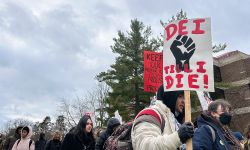Pro-Palestinian protests spread to Michigan State amid nationwide arrests
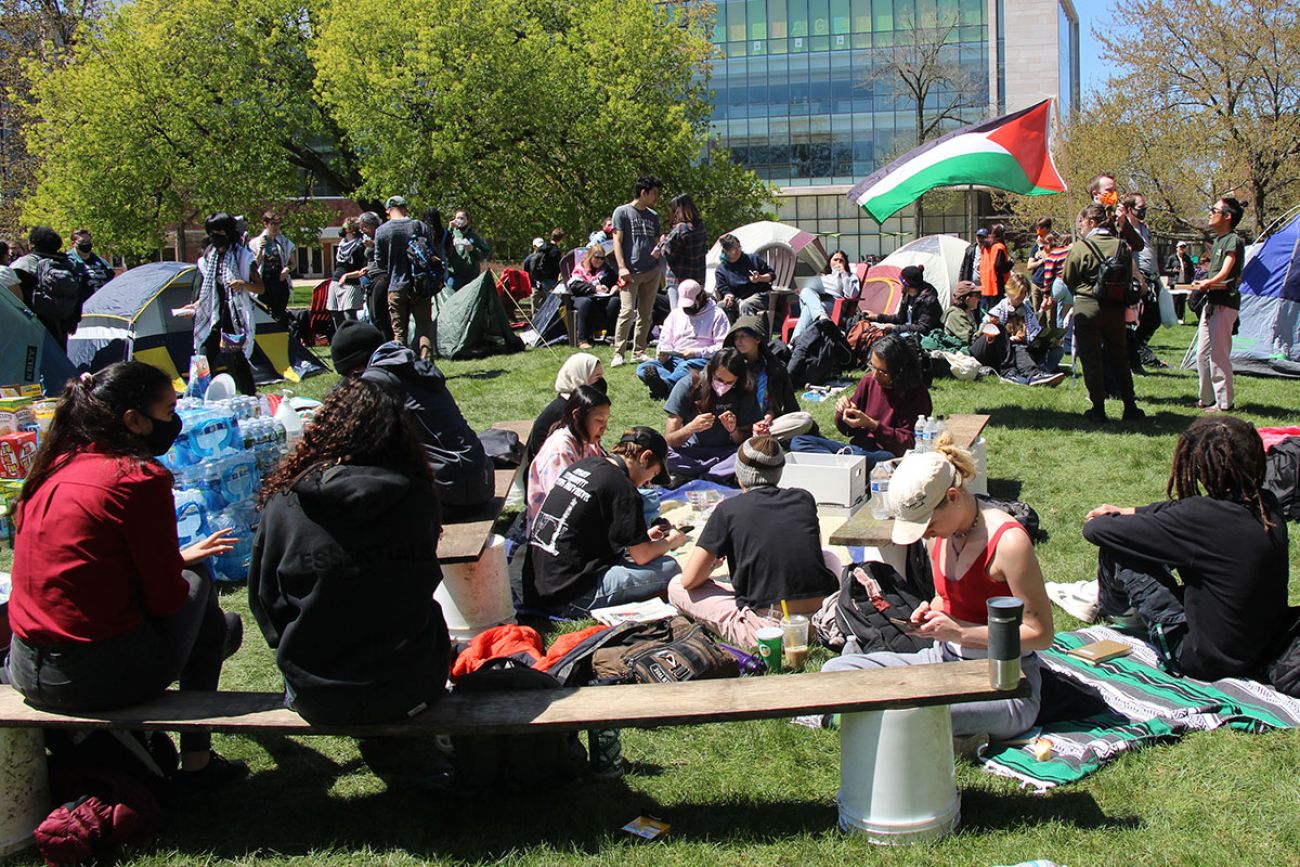
- Students at Michigan State University set up tent encampment to show support for Palestinians amid Israel-Hamas war
- A similar encampment at the University of Michigan has sparked controversy and calls to crack down on demonstrators
- Demonstrations at colleges in New York, Texas and California have sparked arrests
May 4: An arrest, more protests at University of Michigan graduation events
EAST LANSING — Pro-Palestinian demonstrations spread to a second Michigan campus Thursday, as students at Michigan State University set up a tent encampment to demand the school end any support for Israel.
A similar encampment at the University of Michigan, which began Monday, has emerged as a test between the school's free speech principles and what critics say has amounted to anti-Semitic rhetoric.
In East Lansing, students cleared a different test on Thursday: Applying for a permit to ensure MSU police would not shut down their camp on its first day.
“We're here in solidarity (with) Palestine, and we want to center Palestine and Gaza and the genocide that's happening there, and not ourselves,” Camille DuVernois, an MSU junior from Marquette, told Bridge Michigan.
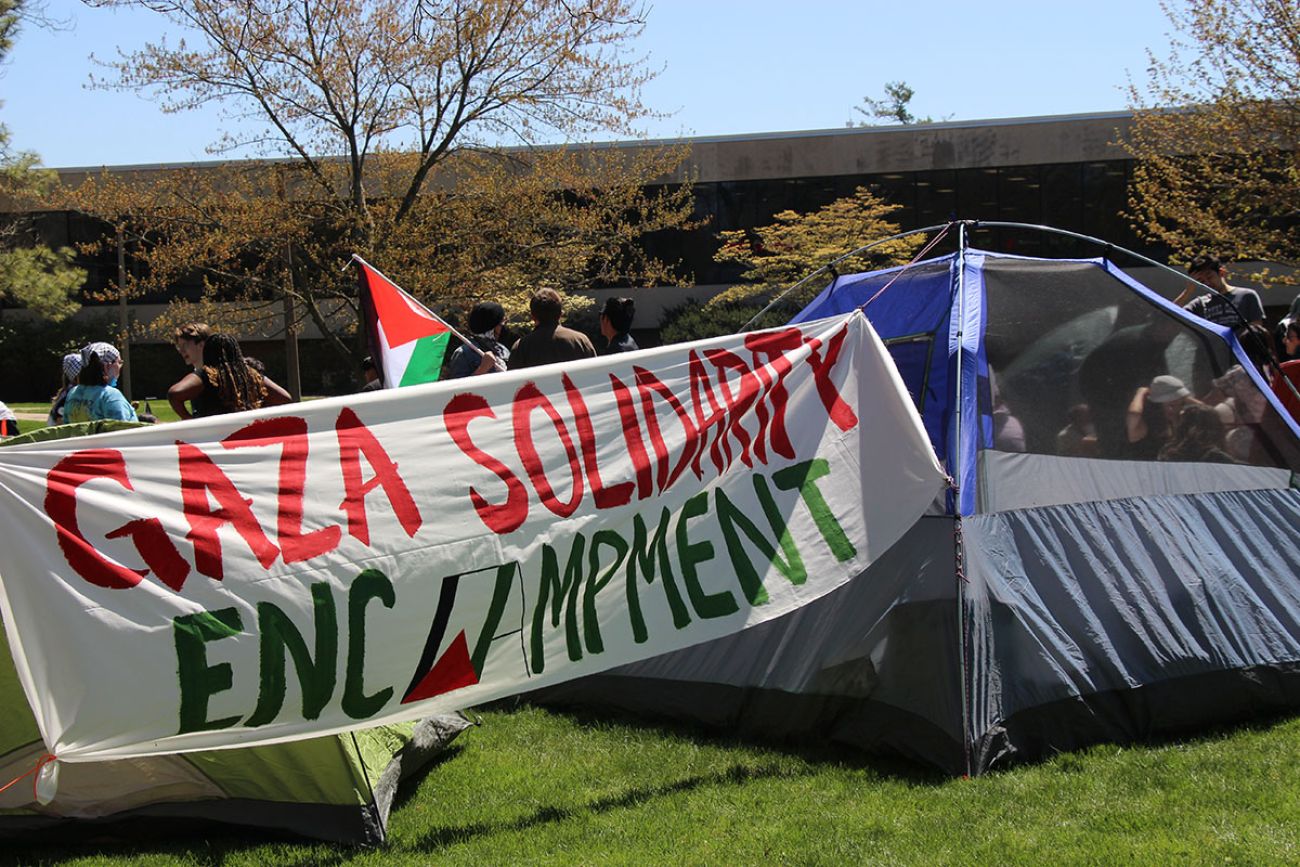
The U-M encampment has sparked controversy, in part because of activist signs and chants for an “intifada,” which the Anti-Defamation League of Michigan has criticized as “a call for violence that only stokes fear, anger and division."
Demonstrators have crossed the line at U-M, state Senate Minority Leader Aric Nesbitt, R-Porter Township, said Thursday in a letter to University President Santa Ono.
Related:
- U-M eyes ‘disruptive activity’ crackdown amid Israel-Hamas war protests
- How Michigan schools are teaching the Israel-Hamas war (Very delicately)
"It is my hope that you and the Board of Regents will take action to address these unsafe conditions on your campus immediately,” he wrote.
The campus demonstrations are the latest actions by college students across the country who are calling for their universities to separate themselves from Israel or any companies with financial ties to that country’s war with Hamas, whose militants killed about 1,200 people in a deadly Oct. 7 attack in Southern Israel.
At U-M, students have previously spoken at board meetings and held rallies in support of Palestine, where more than 34,000 residents have been killed during the Israel-Hamas war.
The U-M and MSU encampments follow a Columbia University demonstration that began last week in New York, where police reportedly arrested more than 100 people.
Tensions have flared at other college campuses too.
There were 57 people arrested Wednesday at the University of Texas at Austin, and while most of the charges were dropped, the state’s National Guard was reportedly on standby at a nearby location should they be needed.
The University of Southern California announced Thursday it was canceling its main stage graduation ceremony, which was scheduled for May 10. The school previously canceled the valedictorian’s speech and on Wednesday, the Los Angeles Police Department arrested 93 people tied to a demonstration.
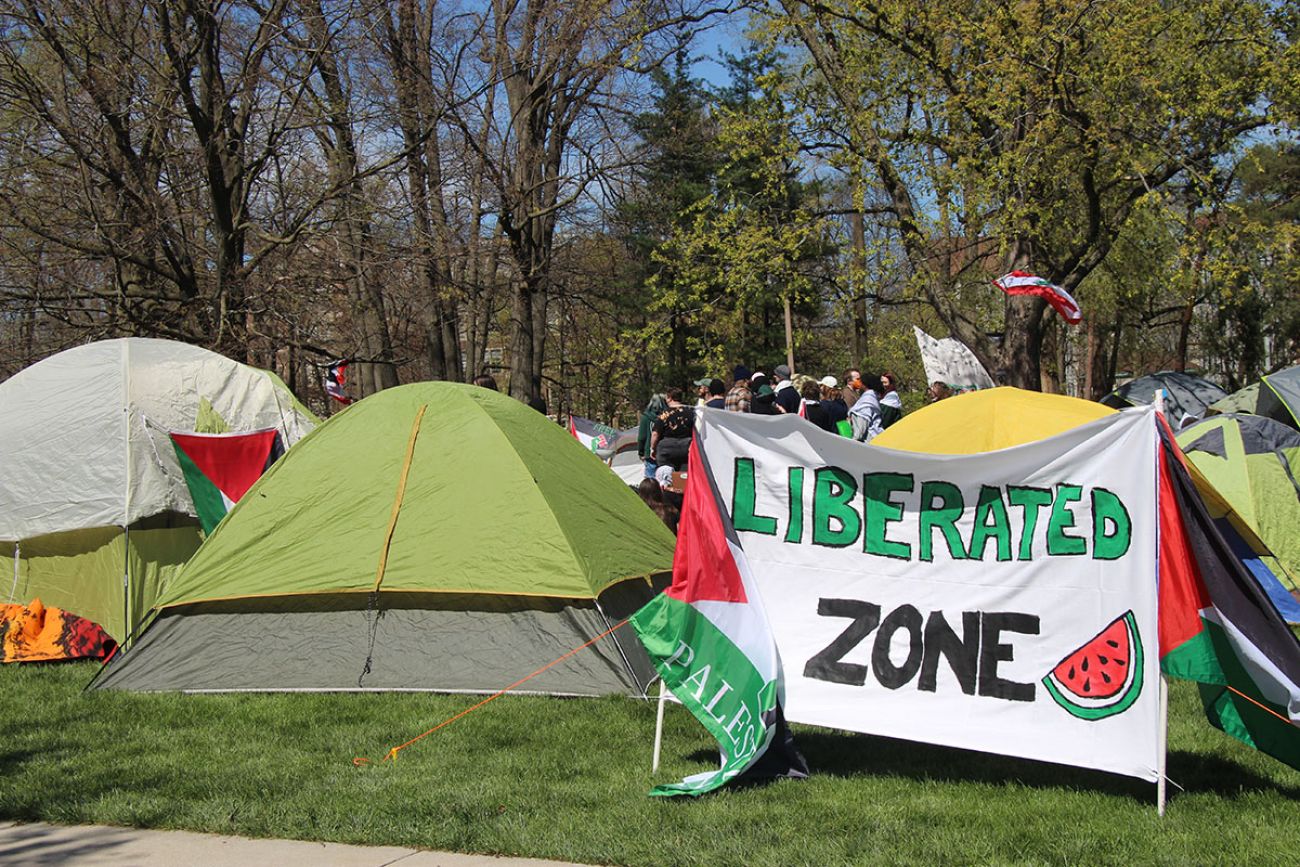
‘Right to free speech’
The first day of the MSU encampment was tame by comparison. Students crafted bracelets and played games. Someone brought their toddler, who munched on a slice of pizza in the nearby grass.
Jesse Estrada White, an MSU junior who helped organize the event, called the encampment a “safe and welcoming space.”
“We're here for the long haul,” Estrada White said. “We're here until Palestine’s free. We're here until we're all free.”
As of Thursday afternoon, activists had erected roughly two dozen tents on the MSU campus, where about 50 to 60 demonstrators gathered. Rather than shut them down, University President Kevin Guskiewicz met with students earlier in the day and told them MSU would review their permit application.
While MSU has a policy against camping on campus without a permit, the university did not act against students who set up tents without them and approved their permit request later in the day.
The MSU Board of Trustees and Guskiewicz, the new university president, seem to “be fairly committed to our right to free speech and our right to protest safely,” said DuVernois, the MSU junior, noting she hopes they “stay committed to that.”
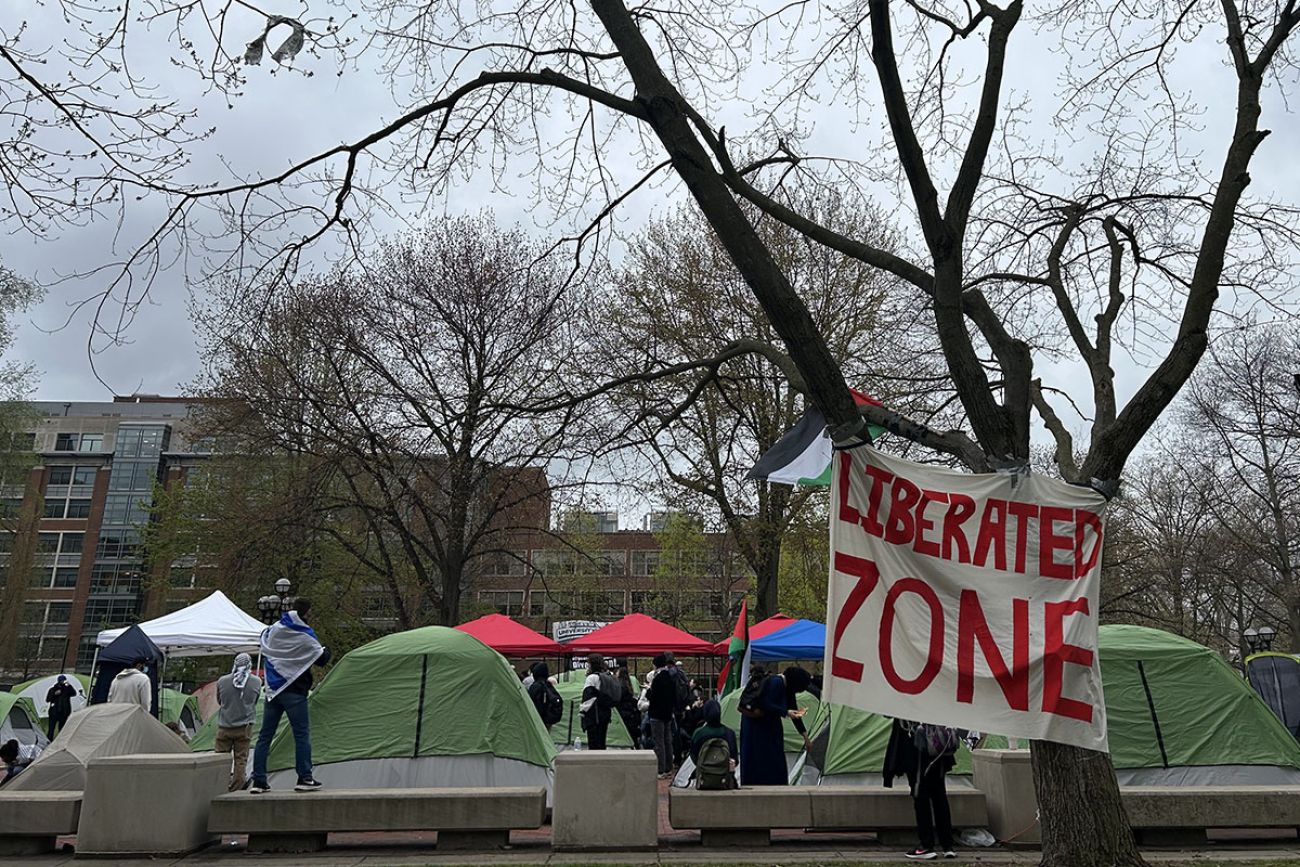
At U-M, where demonstrators set up an encampment on the Diag Monday, officials were already considering a proposal to crack down on "disruptive activity” after advocates disrupted an honors convocation event.
Kim Broekhuizen, director of public affairs at U-M, said Thursday that the university has not made any arrests tied to the demonstration.
“Safety is always a key priority and, as such, we have increased security on campus,” Colleen Mastony, university spokesperson, said in a statement. “We are carefully monitoring the situation and remain prepared to appropriately address any harassment or threats against any member of our community.”
Activists have noticed an increased police presence on campus, but “so far, everything has been peaceful and fine,” graduate student Ember McCoy told Bridge earlier in the week.
‘Upsetting to a lot of us’
U-M Regent Ron Weiser, who is Jewish and a major Republican Party donor, on Thursday called the campus demonstration “unfortunate… because it’s disturbing all the students during their studies for finals,” which began Thursday.
Some Jewish students have held demonstrations of their own, including Ryan Silberfein, president of Michigan Hillel, who was draped in an Israeli flag on Tuesday at the Diag to show solidarity with fellow Jewish students.
She stood near an "intifada" protest banner, which she said calls back to past violence in Israel and is "really upsetting to a lot of us."
Demonstrators, however, made it a refrain.
On Tuesday at U-M, activists chanted: "intifada, intifada / long live the intifada.” At other times, they chanted “from the river to the sea, Palestine will be free," which some interpret as a call to eliminate Israel and is the same phrase that the U.S. House censured Rep. Rashida Tlaib, D-Detroit, for using last year.
U-M students are part of a national movement calling for their schools to end any investments that support Israel’s war effort. One coalition claims the university “commits over $6 billion to investment managers who have profited from investments in Israeli companies and/or military contractors.”
Regent Michael Behm previously told Bridge the university has not directly invested in any Israeli company but has funds with roughly $10 million in related investments.
U-M regents have affirmed they will not divest, but activists have emailed Ono and regents demanding they meet by Sunday at 8 p.m. to discuss the possibility.
"We're planning to be here until the university does that divestment,” McCoy, the graduate student, told Bridge.
Michigan Education Watch
Michigan Education Watch is made possible by generous financial support from:
Subscribe to Michigan Education Watch
See what new members are saying about why they donated to Bridge Michigan:
- “In order for this information to be accurate and unbiased it must be underwritten by its readers, not by special interests.” - Larry S.
- “Not many other media sources report on the topics Bridge does.” - Susan B.
- “Your journalism is outstanding and rare these days.” - Mark S.
If you want to ensure the future of nonpartisan, nonprofit Michigan journalism, please become a member today. You, too, will be asked why you donated and maybe we'll feature your quote next time!



